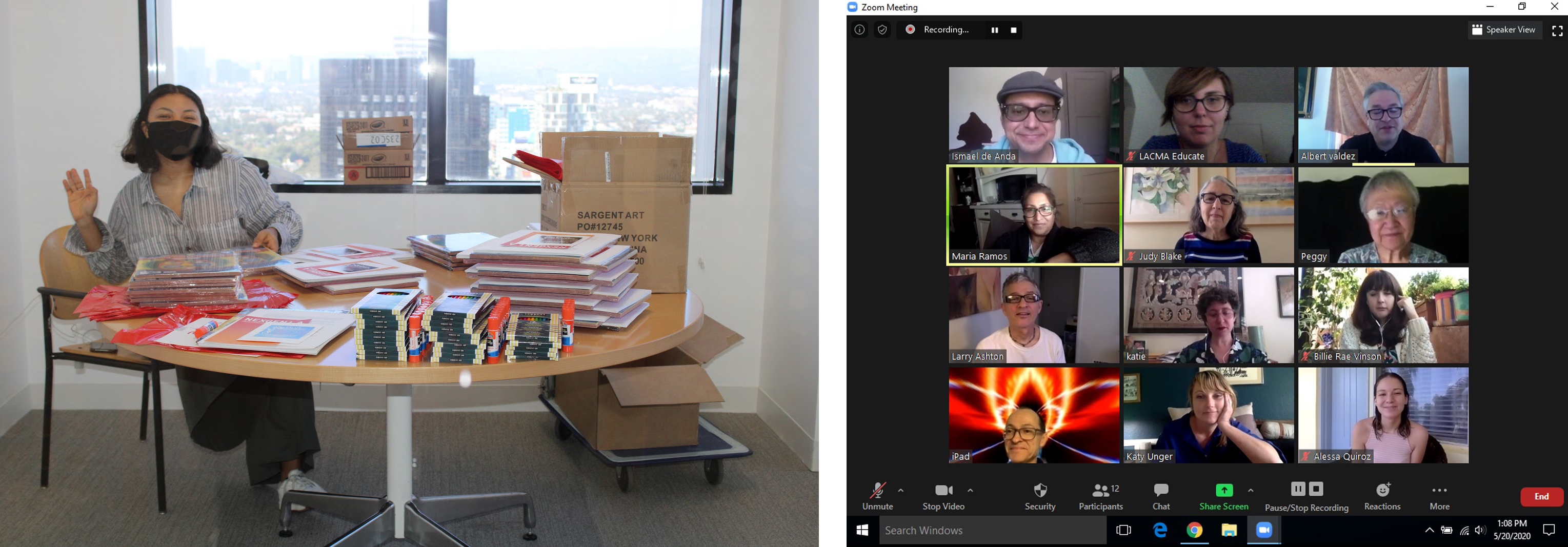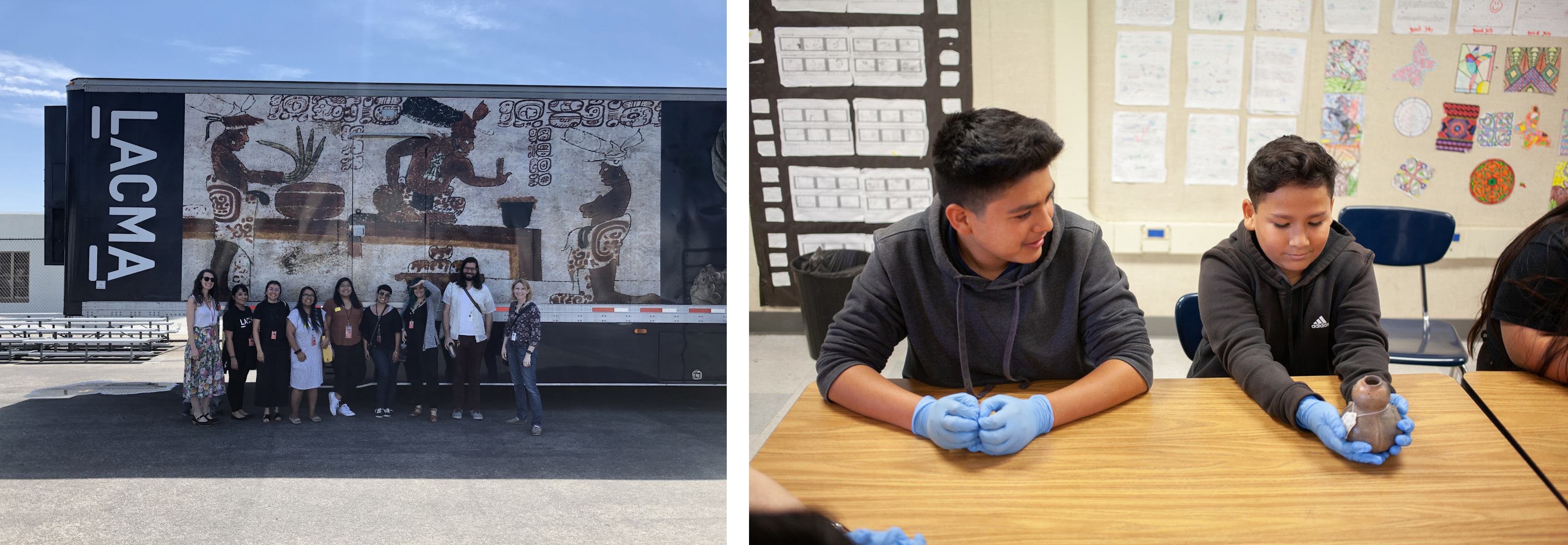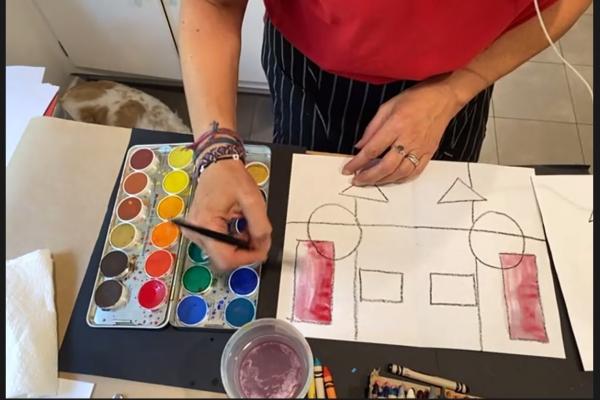A key part of LACMA's work in arts education takes place with K–12 schools and teachers. Through school partnerships, professional development programs for teachers, and Mobile Classrooms, LACMA offers multiple paths for schools to access the visual arts and to activate the creativity of their teachers and students. Creativity has been more vital this school year than ever before as our innovative educators have reinvented our school and teacher offerings to continue our service to K–12 schools during the COVID-19 pandemic. In March, when the museum closed temporarily due to the pandemic, the School & Teacher team at LACMA immediately began talking to and surveying teachers, administrators, and school district staff to determine what schools would need during the pandemic. Staff from over 62 districts, charter school networks, and private schools across the greater L.A. area responded. The answers gave us clear direction and an understanding that we needed to prepare for distance learning—something we had never done before.
LACMA's teaching artists, education coordinators, mobile educators, and artist leads and assistants came together quickly to conceive and develop several new digital programs, each tailored to teacher needs and student developmental levels. We put adaptability, flexibility, and creative thinking at the core of each lesson because we believe engaging with art and art making builds resiliency of thought and emotion. Now, more than ever, students need to be able to express the complex feelings they are coping with in the midst of several intersecting crises.
LACMA's School Programs—offered free of charge thanks to a consortium of generous supporters—are dedicated to giving students that opportunity through several programs that are available online for anyone to use. Just this month, The Rosalinde and Arthur Gilbert Foundation, a longtime LACMA supporter, made a 10-year investment in our programs for K–12 students along with a major gift to the Building LACMA campaign. This gift underscores the Foundation's long-standing commitment to arts education and the powerful role the arts play in students' academic and personal lives.
One of our most popular programs, Creative Classrooms, provides over 60 videos available to teachers with students in kindergarten through fifth grade. These lessons are designed to be flexible and easy for teachers to use in a variety of ways. Our teaching artists speak directly to the learners so teachers can assign arts lessons to students for synchronous or asynchronous instruction. All art projects taught in the videos use items easily found around the house—one of the greatest creative challenges for our instructors. It pushed us all to think outside the box about what materials can be used to create art, resulting in lessons that teach students to look at everyday things in entirely new ways. Lessons focus on social-emotional learning, STEAM (science, technology, engineering, art, and math) and the incredible legacy of Los Angeles artists. While made to coordinate with classroom curricula, these videos are just as accessible for use by after-school programs, homeschoolers, or families—anyone who wants to share great arts lessons with kids!
Kindergarten through fifth grade teachers at Title I schools can also book a live, virtual visit to have a LACMA teaching artist join their class to lead an art-making lesson. LACMA provides art supplies packaged in a convenient kit for every student, based on the grade level and activity. We assemble the kits at LACMA and deliver them to the school to be picked up by families. Though COVID-19 restrictions have sometimes created barriers, we've worked hard to get kits into the hands of every participating student possible.

We constantly seek feedback from teachers, students, families, and administrators to measure the effectiveness and quality of our lessons and programming. Teachers have responded to our digital efforts with these testimonials:
"This workshop was awesome. The lesson and objectives were well organized and the art teacher seamlessly went through it without a glitch. She also answered and addressed my students' needs and concerns."
"My session was bilingual which was perfect for my Dual Language class. I also think it's perfect for classes with a large number of English learners."
"The topic aligned perfectly with my curriculum that I was teaching at the moment. I felt that it had been specifically tailored to work as a culminating project on self identity. It was perfect."

Most years, Mobile Classrooms: Early World Cultures and Art of the Ancestral Americas, made possible by a generous grant from the Max H. Gluck Foundation, brings one of two trucks to middle school campuses to provide a mobile classroom and art studio for students. COVID-19 challenged us to take a set of lessons completely built around students looking closely at and handling real art objects, and make them digital. Building on work begun by the Ancient Americas department, on the platform Sketchfab, students can now use their screens to manipulate 3D scans of objects in 360 degrees, replicating as closely as possible the hands-on experience this program centers. In addition to utilizing courses on Teachable—that provide information on individual objects as well as the cultural history of a variety of early world cultures—teachers can book live virtual visits with our mobile educators who lead students through critical thinking lessons that investigate how to glean information and meaning from objects in LACMA's collection. A follow-up art making visit teaches students to express their personal connections through creativity in an art project based on discussion and close looking of related objects in the collection.
LACMA School Programs gathers feedback from students as well. One seventh grader commented:
"The Codex-style vase with otherworldly creatures was my favorite because it looks so cool. Some artist had to draw that on the vase, and I think that they are very talented. When I grow up, I want to become an artist myself, so I think that the drawings on the vase are really cool. Also, I don't think that those creatures actually existed during that time, so I think it's fascinating how they can come up with something like that."
LACMA also offers special programs for teachers to enhance their skills in teaching art, and in integrating art into other subjects. Entering its 40th year, LACMA's Evenings for Educators remains one of the most popular professional development programs for teachers in Los Angeles. Evenings for Educators went digital in May 2020, and we in the Education department had a moment of inspiration—why had we not been doing this all along? Suddenly we had teachers who had always wanted to attend, but couldn't, because driving to LACMA at 4 pm on a weekday simply wasn't possible. Teachers signed in from San Diego, Palm Springs, and San Francisco, and we realized we had just found a whole new audience, as the quotes below show:
"So much more convenient to participate in the comfort of your own home! Years past it's been a time of day where I can't attend. This was perfect!"
"I LOVE Evenings for Educators and have really missed being able to attend. So I wasn't sure how this would go, virtually. I have to say—it was so wonderful. I'm beyond glad that I signed up. I have been having such hard days and this session definitely helped lift my mood. I'm very appreciative."
"The virtual experience was actually terrific. In-person provides a communal setting, framed by the museum's galleries, but the virtual was just as great. I appreciated the breakout room sessions. Overall, excellent."
While digitization created challenges for staff in 2020—demanding time and effort to develop new skills for producing online videos and live classes, all as we figured out how to work from home—we embraced these opportunities and overcame difficulties by adjusting our teaching approaches and diving into the learning that was happening for us as educators. Through their participation, students and teachers found new ways to express their unique talents, skills, and identities. They also helped make Creative Classrooms, Mobile Classrooms, and Evenings for Educators programs, and the people who participate in and make them possible, visible in new ways—to one another and to the community at large.



